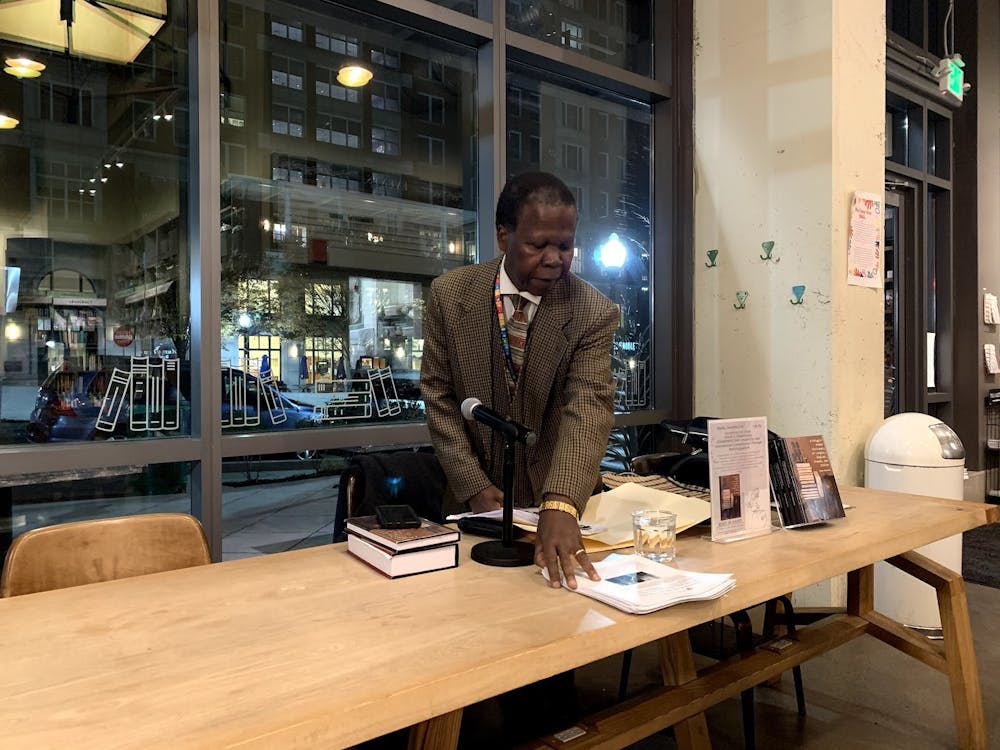Zekeh Gbotokuma, an associate professor of philosophy at Morgan State University, gave a lecture titled “Cosmoportism: ‘UniverCity’ and International Competency Through Multilingualism” at the Charles Village Bird in Hand on Monday, Nov. 25.
His presentation focused on the question of how multilingualism can increase cross-cultural understanding in a global society.
“If each one of us, after acquiring all kinds of knowledge, could be able… to share that knowledge not only in our native language but also in the language or languages other than our own language, imagine what kind of power you would have with that ability,” Gbotokuma said.
The event was co-hosted by Polyglots in Action for Diversity, Inc., a local nonprofit organization that Gbotokuma established in 2005, and the Hopkins Alexander Grass Humanities Institute.
Gbotokuma explained that between living in and traveling through the Congo, where there are over 200 spoken languages and dialects, and Europe, linguistic diversity has been a constant and important factor in his life.
He argued that exposure to such linguistic diversity is one of the factors that helps a person develop what he calls international competency. Gbotokuma stressed the importance of embracing linguistic diversity in the United States.
“It takes many things to develop international competency. For the purpose of tonight, my focus is on languages because of what I have seen as a problem in the U.S. as far as interest in other languages is concerned,” Gbotokuma said.
For Gbotokuma, international competency is embodied in his idea of cosmoportism, a portmanteau that he created.
“The use of the words cosmos and port as part of the name is based upon my belief that... world-ready education at the level of higher learning should be students’ passport and GPS to navigating our global village,” he said.
Gbotokuma argued that people today are increasingly living in what he termed univer-cities, or universal cities, characterized by the residence in one city of people from many different nations residing together.
Gbotokuma said that universities like Morgan State and Hopkins are excellent microcosms of the univer-city phenomenon, which he calls co-presence, and are well positioned to capitalize on the benefits it can provide.
“If we use very well this co-presence of people from the four corners of the universe, if we use very well the presence of international students especially,” Gbotokuma said, “that alone can be a wonderful recipe for international education and competency.”
He argued that such international education and competency can result in new experiences, different perspectives, and fresh academic and economic opportunities that otherwise would not be available to people.
To reinforce his point, Gbotokuma shared how knowing Italian helped him secure a job in Germany for six summers which helped him pay for his education after he lost a scholarship he had been relying upon.
To conclude, Gbotokuma doubled back to insist again on his belief in the power of language. People should realize that being monolingual is actually a hazard, he argued.
“We are speaking animals. The ability to communicate through language is one of the essential things about being a human being,” he said. “There are so many languages and you cannot know all of them, but there should be no excuse for anybody to graduate from university without that communication ability.”
Morgan State junior Eugene Kong explained that he highly valued Gbotokuma’s main argument.
“Cosmoportism is very important to me,” Kong said.
Emma Snyder, the owner of the Ivy Bookshop, said that she was particularly happy to see Gbotokuma start a conversation around how language, culture and citizenship can all influence one another.
“Having access to multiple languages and communication across cultures and being a citizen of a culture that is broader than your immediate proximate surroundings is an essential thing in the world,” she said.





